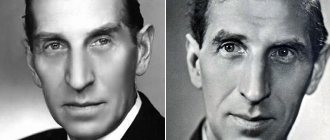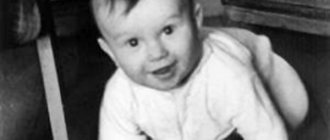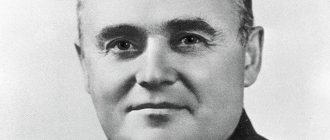Childhood and family of Sergei Dovlatov
The future writer was born into a typical Soviet international family.
Sergei's father (Jewish by nationality) - Mechik Donat Isaakovich, worked as a stage director in the theater. The writer's mother Dovlatova Nora Sergeevna (Armenian by birth) was a literary proofreader. During the war, the Dovlatov family was evacuated from Leningrad to Ufa. The family spent the entire 3 years of evacuation in a house for NKVD employees. After returning to Leningrad, Donat Mechik left the family and his further communication with his son was limited to correspondence. Sergei grew up as a calm child. Being noticeably taller and stronger than his peers, he was never known as a fighter; on the contrary, he was often offended by his classmates.
The biography of Sergei Dovlatov was not easy
At school Seryozha studied mediocrely. Teachers spoke of him as a dreamer who always had his head in the clouds.
Journalistic career of Sergei Dovlatov
After graduating from school in 1959, Dovlatov entered the Faculty of Finnish Language and Literature at Leningrad State University.
Zhdanova. For constantly missing lectures and ignoring the demands of teachers, Sergei was expelled from the university in his second year. In 1962, Dovlatov was drafted into the army, where he served until 1965.
After serving in the army, Dovlatov entered the Faculty of Journalism of Leningrad State University. Financial insecurity forces Sergei to combine study with work.
Dovlatov’s journalistic activity begins with work in one of the Leningrad newspapers. Gradually, Dovlatov makes acquaintances among writers and journalists. Writer Vera Panova invited an aspiring writer to work as her personal secretary.
In 1972, Dovlatov moved to Tallinn and began working as a correspondent for the local newspaper “Soviet Estonia”. Then there was work in the newspaper “Evening Tallinn”. At the same time, he sent reviews to the magazines “Neva” and “Zvezda”.
The Tallinn period of life is significant for the attempt to print the collection “City Stories” at the Eesti Raamat publishing house, but by order of the KGB of the Estonian SSR, the book set was destroyed.
All rare recordings of Dovlatov In 1975, Dovlatov returned to Leningrad. He began working in the magazine “Koster”, and then as a guide in Mikhailovsky (Pushkin Nature Reserve). I tried to publish my stories several times, but magazines refused to print them. The writer’s works began to appear in Samizdat and emigrant magazines. This became the reason for his expulsion from the Union of Journalists of the USSR.
Biography of Dovlatov
Sergei Donatovich Dovlatov was born on September 3, 1941 in Ufa. His father, Donat Mechik, worked as a theater director, and his mother, Laura Sergeevna, was an actress.
After the end of World War II, the Dovlatov family moved to Leningrad.
Childhood and youth
From childhood, Sergei was an inquisitive boy with a developed imagination. His favorite subject at school was literature (see interesting facts about literature), and therefore he began writing poetry in elementary school.
When Dovlatov was 11 years old, his poems were published in Lenin Sparks. An interesting fact is that the future dissident dedicated one of his works to Joseph Stalin.
After school, Dovlatov studied at Leningrad State University at the Faculty of Philology.
During this period of his biography, he especially liked the work of Ernest Hemingway. Having studied at the university for less than 3 years, Dovlatov was expelled from it for poor academic performance.
Dovlatov was then drafted into the Soviet army, where he became a guard at a colony located in the Komi Republic.
The service had a very serious influence on the development of his personality, and also allowed him to collect a lot of interesting material.
Returning from the army, Sergei Dovlatov successfully passed the exams at the same university (from which he was expelled) to the Faculty of Journalism.
After graduating, he began working as a journalist in the Leningrad publication “For Personnel to the Shipyards.” During this period of his biography, he met aspiring prose writers from the literary society “Citizens”.
Then Dovlatov worked in many other newspapers and magazines, continuing to write various works. However, he could not publish them anywhere, since they ran counter to Soviet ideology.
After some time, Sergei Donatovich moved to Estonia, where he also continued to work in various publishing houses. In addition, he manages to work as a guide at the Alexander Pushkin Museum-Reserve.
In the mid-70s, Dovlatov returned home. Soon he managed to publish one of his stories in the magazine “Koster”. It is interesting that Bulat Okudzhava and Joseph Brodsky also published in this publication.
Since Dovlatov could not publish many of his works in his homeland, the prose writer published them abroad. When the KGB learned about this fact, Sergei Dovlatov began surveillance, which will continue until the end of his life.
In connection with these biographical events, in 1978 the journalist decides to emigrate to the USA.
Arriving in New York, he began working in radio and also became editor of the New American newspaper. Soon Dovlatov became a popular writer. Despite this, he really misses Russia in general and Leningrad in particular.
Sergei Dovlatov in exile
Constant persecution, financial difficulties, and the inability to legally publish his works pushed Dovlatov to emigrate.
Following his wife Elena and daughter Ekaterina, the writer in 1978 first went to the capital of Austria, and then moved to New York.
In New York in 1980, he headed the New American newspaper, published in Russian, and at the same time worked at Radio Liberty.
Sergey Dovlatov. Sexuality in literature In America, Dovlatov began a completely different life. If in his homeland the writer was never able to publish a single book, then in America books of his prose were published one after another.
By the mid-1980s, Dovlatov had become a popular writer in the United States; his works were published in such popular magazines as Partizan Review and The New Yorker. During the years spent in exile, twelve books by Dovlatov were published in the USA and Europe.
Personal life of Sergei Dovlatov
The writer’s personal life was difficult, and his relationships with women were quite complicated. He was considered an incorrigible Don Juan. He was officially married twice - to Asa Pekurovskaya (1960–1968) and Elena Dovlatova (1969–1971). Once he was in a civil marriage with Tamara Zibunova (1975–1978).
Sergei Dovlatov with his first wife Asya Pekurovskaya (left)
It is interesting that the writer’s first daughter, Katya, was born in 1966 from his second wife, and the second, Masha, was born 4 years later from his first. Five years later, his common-law wife gave him a third daughter, Alexandra. Already in exile, in 1984, the last child was born from his second wife, Elena, son Kolya (Nicholas Dawley).
He met his first wife, Asya Pekurovskaya, when he was a student. We can say that she was the writer's first true love. In 1960, they officially registered their marriage.
Dovlatov’s second beloved woman was Elena Dovlatova. He met her in 1965, and in 1966 their daughter Ekaterina was born. And only two years later, in 1968, Sergei divorced Asya. In 1969, Elena and Sergei Dovlatov got married. But until the end of his life, Dovlatov could not determine which of these two completely different women he loved more.
Sergei Dovlatov sadly wrote about himself and his children that his children are reluctant to speak Russian, and he is reluctant to speak English.
In August 1990, the writer died of a myocardial infarction. He found his last rest in the Mount Hebron Jewish cemetery in New York, in its Armenian part.
In 1995, a literary prize named after him was established in Dovlatov’s hometown of St. Petersburg. It is awarded either to a St. Petersburg writer for the best story, or for the best story that was published in St. Petersburg.
Full biography - Sergey Dovlatov
Sergei Donatovich Dovlatov (according to his passport - Dovlatov-Mechik; September 3, 1941, Ufa - August 24, 1990, New York) - Soviet and American writer and journalist.
Biography
Sergei Dovlatov was born on September 3, 1941 in Ufa, in the family of theater director Donat Isaakovich Mechik (1909-1995), a Jew, and actress, and later proofreader Nora Stepanovna Dovlatova (1908-1999), an Armenian. His parents were evacuated from Leningrad to the capital of the Bashkir Autonomous Soviet Socialist Republic in July 1941 and lived for three years in the house of NKVD employees on the street. Gogol, 56.
Since 1944 he lived in Leningrad on the street. Rubinshteina, 23. In 1959, he entered the Finnish language department of the Faculty of Philology of Leningrad State University and studied there for two and a half years. He communicated with Leningrad poets Evgeny Rein, Anatoly Naiman, Joseph Brodsky and writer Sergei Volf (“The Invisible Book”), artist Alexander Nezhdanov. He was expelled from the university for poor academic performance.
He served for three years in the internal troops guarding penal colonies in the Komi Republic (the village of Chinyavoryk), near the city of Ukhta. According to Brodsky’s memoirs, Dovlatov returned from the army “like Tolstoy from the Crimea, with a scroll of stories and some stunned look in his eyes.”
Dovlatov entered the Faculty of Journalism of Leningrad State University, worked in the student circulation of the Leningrad Shipbuilding Institute “For Personnel to Shipyards,” and wrote stories.
After college, he worked for the newspaper “Banner of Progress” LOMO.
He was invited to the group “Citizens”, founded by Maramzin, Efimov, Vakhtin and Gubin. He worked as the literary secretary of Vera Panova.
From September 1972 to March 1975 he lived in the Estonian SSR. To obtain Tallinn registration, he worked as a fireman in a boiler room for about two months, while at the same time being a freelance correspondent for the newspaper “Soviet Estonia”. Later he was hired by the weekly newspaper “Sailor of Estonia” published by the Estonian Shipping Company, taking the position of executive secretary.
He was a freelance employee of the city newspaper “Evening Tallinn”. In the summer of 1972, he was hired to work in the information department of the newspaper “Soviet Estonia”. In his stories included in the book “Compromise,” Dovlatov describes stories from his journalistic practice as a correspondent for “Soviet Estonia,” and also talks about the work of the editorial office and the lives of his fellow journalists. The typesetting of his first book “Five Corners” in the publishing house “Eesti Raamat” was destroyed on the orders of the KGB of the Estonian SSR.
He worked as a guide in the Pushkin Nature Reserve near Pskov (Mikhailovskoye).
In 1975 he returned to Leningrad. Worked for the magazine "Koster".
Wrote prose. Magazines rejected his works for ideological reasons. Only a story was published in “Neva” and a story “Interview” on a production topic in “Youth” (in 1974), for the latter he received a respectable 400 rubles. He also managed to publish more than 10 reviews in Neva and Zvezda.
Dovlatov published in samizdat, as well as in the emigrant magazines “Continent”, “Time and We”. In 1976 he was expelled from the Union of Journalists of the USSR.
In August 1978, due to persecution by the authorities, Dovlatov emigrated from the USSR and settled in the Forest Hills area of New York, where he became editor-in-chief of the weekly newspaper The New American. Members of his editorial board were Boris Metter, Alexander Genis, Pyotr Weil, ballet and theater photographer Nina Alovert, poet and essayist Grigory Ryskin and others. The newspaper quickly gained popularity among emigrants. Books of his prose were published one after another. By the mid-1980s, Dovlatov achieved great reader success, published in the prestigious magazines Partisan Review and The New Yorker.
During twelve years of emigration, he published twelve books in the USA and Europe. In the USSR, the writer was known from samizdat and his author’s broadcast on Radio Liberty. While preparing his early works for publication, he rewrote them, and in his will he stipulated a ban on the publication of all texts he created in the USSR.
Sergei Dovlatov died on August 24, 1990 in New York from heart failure. He was buried in the Mount Hebron Jewish Cemetery in Queens, New York.
Personal life
Sergei Dovlatov was officially married twice.
— First wife: Asya Pekurovskaya, marriage lasted from 1960 to 1968. — In 1970, after the divorce, she had a daughter, Maria Pekurovskaya, now vice president of the advertising department of the film company Universal Pictures. In 1973 they emigrated from the USSR to the USA.
- Actual wife: Tamara Zibunova. — Daughter of Alexandra (born 1975).
- Second wife: Elena Dovlatova (nee Ritman). — Daughter Ekaterina (born 1966). - Son Nikolai (Nicholas Dawley; born December 23, 1981), born in the USA.
Works
Lifetime editions
Dovlatov did not allow any text published in the USSR before 1978 to be reprinted under any circumstances. List of books published with his direct or indirect participation:
- The Invisible Book - Ann Arbor: Ardis Publishing, 1977 - Underwood Solo: Notebooks - Paris: The Third Wave, 1980 - Compromise - New York: Silver Age, 1981 - Zone: Notes of a Warden - Ann Arbor: Hermitage, 1982 - Preserve - Ann Arbor: Hermitage, 1983 - March of the Lonely - Holyoke: New England Publishing, 1983 - Ours - Ann Arbor: Ardis Publishing, 1983 - Underwood Solo: Notebooks - 2nd edition, expanded - Holyoke: New England Publishing, 1983 - Demarche of Enthusiasts (co-authors Vagrich Bakhchanyan, Naum Sagalovsky) - Paris: Syntax, 1985 - Craft: A Tale in Two Parts - Ann Arbor: Ardis Publishing, 1985 - Foreigner - New York: Russica Publishing, 1986 - Suitcase - Tenafly: Hermitage, 1986 - Performance - New York: Russica Publishing, 1987 - Not only Brodsky: Russian culture in portraits and anecdotes (co-author Maria Volkova) - New York: Slovo, 1990 - Notebooks - New York: Slovo , 1990 - Branch - New York: Slovo, 1990
Some posthumous editions
- Reserve - L.: Vasilyevsky Island, 1990. - Zone; Compromise; Reserve - M.: PIK, 1991. - Sergey Dovlatov. Collection of prose in three volumes, illustrations by Alexander Florensky, 3 volumes. - Limbus-press, St. Petersburg, 1995. - ISBN 5–8370-0307‑X.. - Sergey Dovlatov. Little-known Dovlatov. Collection, illustrations by Alexander Florensky. - JSC "Zvezda Magazine", St. Petersburg, 1995. - ISBN 5-7439-0021-3.. - Sergey Dovlatov. Collected Works, 4 volumes. — ABC-Classics, St. Petersburg, 2003–2004. — ISBN 5–352-00079–6.. — Reading Lessons. Philological prose. - St. Petersburg: Azbuka, 2010. - 384 p. — ISBN 978-5-9985-0845-5. (The first annotated edition of notebooks and essays about literature) - S. Dovlatov. Life and opinions. Selected correspondence. St. Petersburg: Zvezda Magazine, 2011. 384 pp., 5000 copies, ISBN 978-5-7439-0156-2 - Dovlatov S. Latest book: Stories, articles. - St. Petersburg: Azbuka, Azbuka-Atticus, 2011. - 608 p. + on (16 pp.), ISBN 978–5‑389–02233‑1
Film adaptations of works
- 1992 - “In a Straight Line”, dir. Sergey Chliants - based on the stories of S. Dovlatov - 1992 - “High Security Comedy”, dir. Viktor Studennikov and Mikhail Grigoriev - film adaptation of a fragment of the work "Zone" - 2020 - "The End of a Beautiful Era", dir. Stanislav Govorukhin - film adaptation of the collection of short stories "Compromise".
Correspondence between Dovlatov and Efimov
In 2001, the Zakharov publishing house published the book “Sergei Dovlatov - Igor Efimov. Epistolary novel." The book covers correspondence between Dovlatov and Efimov from 1979 to 1989. Several publishing houses, to which Efimov approached with a proposal to publish the book, refused to do so due to copyright concerns. During his lifetime, Dovlatov opposed the publication of his letters, which he mentioned in one of his letters to Efimov. The Dovlatov family, primarily the writer’s widow Elena Dovlatova, who is the owner of the copyright on everything written by Dovlatov, also objected to the publication of the letters, in accordance with his will. Zakharov’s publishing house decided to publish the correspondence, arguing that the publishing house’s responsibility to readers is greater than its responsibility to Dovlatov’s family. However, Elena Dovlatova, together with her daughter Katerina, managed to prove their rights to correspondence in a Russian court and obtain a ban on the publication of the book a year after selling the entire circulation of 15 thousand copies. The court refused Elena Dovlatova's request to destroy all published copies of the book.
Memory of Dovlatov
— On September 3, 2007 at 15:00 in St. Petersburg, on Rubinshteina Street, building 23, a solemn opening ceremony of a memorial plaque to the writer took place. The author of the memorial plaque is Alexey Arkhipov, a member of the Union of Artists of Russia. The opening ceremony of the memorial plaque was attended by cultural figures, artists, and members of the city government. The writer's widow Elena Dovlatova and his daughter Katerina, head of the International Sergei Dovlatov Foundation, came to the northern capital to participate in the ceremony.
— On September 3, 2003, in Tallinn, in honor of Sergei Dovlatov, a memorial plaque was installed on the wall of house No. 41 on Vabriku Street (until the early 1990s - I. V. Rabchinsky Street), where the writer lived in apartment No. 4 for almost three years ( 1972-1975). Cast from bronze, the board represents a book spread, with text on the left and a stylized image on the right, taking his favorite dog, the fox terrier Glasha, out for a walk. The image is based on a drawing by Alexander Florensky from the famous St. Petersburg group of artists “Mitki”, who illustrated Dovlatov’s “Collected Prose in 3 Volumes” (published by Limbus Press). The memorial plaque, made by the Estonian sculptor Irina Rätsepp, was installed on the initiative and at the expense of the Estonian public committee “Dovlatov memo” with partial financial support from the Moscow government and the Moscow Foundation for International Cooperation named after Yuri Dolgoruky.
— The literary Dovlatov Prize, awarded by Zvezda magazine, is named in honor of Sergei Dovlatov.
— In 2008, the gallery project “Nevskaya Tower” and the hand-printing studio “B&F” released an album of prints “Drawings by A. Florensky for the works of Sergei Dovlatov,” dedicated to the 15th anniversary of the publication of the writer’s first three-volume work with illustrations by Alexander Florensky. This three-volume work, published throughout the 1990s, became a symbol of the writer’s mass popularity. In 2011, for the writer’s anniversary, a series of prints “Dovlatov’s Neighborhood” was released based on the dust jackets for the same publication.
— In 2011, the publishing house “Azbuka” was preparing to release an anniversary album of photographs dedicated to the 70th anniversary of the birth of S. Dovlatov, compiled from the works of Nina Alovert, but a lack of funds delayed the implementation of this project.
— In 2011-2012, as part of the Dovlatov Days 2011, the exhibition project “Dovlatov’s Surroundings” was held, dedicated to the 70th anniversary of the writer. Exhibitions of Alexander Florensky’s prints for the first three (four) volume book were held in all Dovlatov’s places: Leningrad, Tallinn, Pushkin Hills and New York.
— In one of their songs, the Russian group “Ellipsis” mentions the name of Sergei Dovlatov as “not willing to make peace.”
— The house-museum of the writer Sergei Dovlatov in the Pushkin Mountains opened on September 3, 2011.
— On November 26, 2011, in the city of Ufa (Bashkiria), a memorial plaque was installed for the writer on the facade of house No. 56 on Gogol Street, where he was born and spent his early years, which he mentioned more than once in his works.
— On September 7, 2014, Sergei Dovlatov Street was opened in New York.
— In Russia, on August 28, 2014, the first name of Sergei Dovlatov was given to a new street in the city of Ukhta, which he visited many times during his military service.
— On September 4, 2020, at house 23 on Rubinshteina Street in St. Petersburg, as part of the three-day D-Day festival dedicated to the 75th anniversary of Sergei Dovlatov, the unveiling ceremony of a monument to the writer by sculptor Vyacheslav Bukhaev took place.
Cultural influence
— In 1994, Pyotr Stein staged the play “The New American” at the Moscow Art Theater. A.P. Chekhov based on the life of Sergei Dovlatov and his works “Zone: Notes of a Warden” and “Reserve”. Sergei Dovlatov is played by Dmitry Brusnikin. The play has been successfully performed on the small stage of the Moscow Art Theater for more than 20 years. — Mikhail Weller named one of his autobiographical stories “The Knife of Serezha Dovlatov.” - Books by S. Dovlatov - “Zone”, “Suitcase”, “Reserve”, “Stories” - are included in the list of 100 books recommended by the Ministry of Education and Science of Russia for independent reading by schoolchildren. — For a quarter of a century, Dovlatov has been one of the most read, frequently and widely published Russian writers. Along with Joseph Brodsky and Alexander Solzhenitsyn, he is one of the three most famous Russian-language authors in the West of the second half of the 20th century. — Dovlatov’s works have been translated into more than thirty languages of the world. He is the only Russian-language writer whose ten stories were published in the elite New Yorker magazine.
Alcoholism
S. D. Dovlatov suffered from alcoholism. According to the literary critic A. Yu. Ariev, who knew Dovlatov well in his youth: It was a more or less mass phenomenon, because, in general, we all drank quite a lot, and although in the bohemian and simply literary environment this was a common phenomenon, but the way all these Stalin Prize laureates and masters of socialist realism drank is so incomprehensible. We were no match for them. They just drank crazy somewhere behind their blue fences, and we had to move from store to store, get money somewhere and everything else.
Alexander Genis, who knew Dovlatov well, wrote: Sergei hated his binges and fought furiously against them. He had not drank for years, but vodka, like a shadow at noon, was patiently waiting in the wings. Recognizing her power, Sergei wrote shortly before his death: “If I don’t drink for years, then I remember about Her, cursed, from morning to night.”
In his interview, sculptor Ernst Neizvestny notes: The fact is that I drank with him. His drunkenness, from a psychiatric point of view, but you don’t need to be a psychiatrist for this, any man who drinks knows this, it was a form of suicide. That's exactly how he drank. Not in the sense of a lot, but psychologically. It was as if he stuck a knife into his heart and said: “On you, on you, on you”... It was dark Russian drunkenness, which is great, great reflected in Vysotsky’s songs: “What kind of house is quiet ...”, “everything is wrong! It's not like that, guys." Therefore, there is some kind of desire to run away somewhere, but where to run? to death, of course he had.










